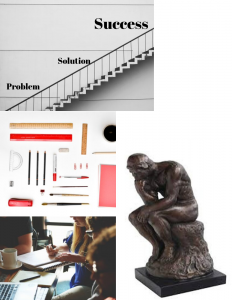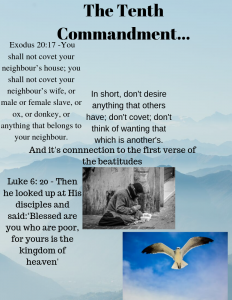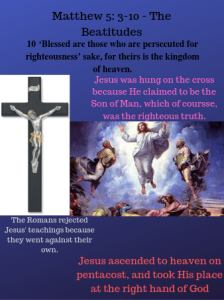Question set A
Luke 10:38-42
Summary: Mary sat at the Lord’s feet and listened to what he was saying. Mary sat listening to the Lord while Martha, her sister did household work. Martha wanted Mary’s help to do the jobs, but she was listening to Jesus. Martha asked Jesus to tell Mary to help her do her work but Jesus tells her that Mary chose the best choice, to listen to Jesus.
Answer: Mary sat at the Lord’s feet and listened to what he was saying.
John 11:5-6
Summary: Lazarus grows ill and Jesus stays with him for 2 days while Mary and Martha leave.
Answer: Jesus loved Martha, Mary and Lazarus and when he found out that Lazarus was ill he stayed 2 days because he didn’t want to be left alone.
John 11:5-6
Summary: Martha went to see Jesus and Mary stayed home, and was then upset with Jesus because Lazarus had died.
Answer: Martha’s faith in the lord is based on her relationship with Jesus because she believes that if Jesus was with her brother he wouldn’t have died, and she had faith that if he stayed he wouldn’t have died. Lazarus dies and Martha believes if Jesus stayed, he would still be alive.
Set B
Exodus 4:10-17-
Summary: Moses talks to the lord telling him that he is slow in speech and tongue with the lord responding that he shall be his mouth and tell Moses what to say. Moses didn’t believe he could do this so he asked the lord if he could send somebody else, this angered the Lord and the lord asked him if he should send his brother Aaron and why Moses shall be the mouth.
Answer: Aaron’s role in this passage was to be the voice of others, Aaron the Levite is a fluent speaker. This is a sign of linguistic intelligence.
Acts 8:26-38 –
Summary: An Angel from the lord comes and talks to Phillip and the Angel tells him to go south to the road that goes from Jerusalem to Gaza. Phillip went there after he had been talked to. Meanwhile there was a Eatheopian eunuch, who was in charge of the Eathiopian queens entire treasury who came on a chariot to speak the prophet of Isaya to the queen. Then the spirit tells Philip to join the man sat on the chariot. He does and asks if he understands what he is reading. He responded with, “How can I unless someone guides me?” and invited philip to sit beside him. They continued to read the prophet. Philip tells him about Jesus and they went along the road and find water that prevents him from being baptized so philip baptizes him.
Answer: The two people in this story are Philip and Ethiopian eunuch. The eunuch was baptized because Jesus was allowing him to.
Set C
1 Samuel 16:23
Who calms Saul and how?
Answer: David calms Saul by playing the lyre.
Summary: Whenever the evil spirit came upon Saul, David played the lyre to calm him.
2 Chronicles 5:11-14
Summary: Priests and musicians gathered to share in the art of music to show their faith in alternative means
Answer: Before the presence of God fills the temple, the people all gather in song and prayer together to show the Lord their devotion and faith.
Set D
John 1:3-9
Jesus is described as the beginning of life and all new creation. Without him, nothing would have been created. There would be no light to overcome the darkness. John was sent by God to prove to people that Jesus is true.
Mark 13:24-27
Jesus describes the world in chaos, with the sun going dark. Then said he would come in his glory, and bring light back to the world. If you are in the dark, Jesus can bring the light back.
Summary: Mark is telling us if we need light look to God because he is the glory and the light of our sky which will shine if you want God to make the place bright.
Ezekiel 1: 4-28
Ezekiel uses images to help understand God. Ezekiel explained what he saw. He told about the four creatures, that they had four different heads, and they had 2 wings each. He said they walked in a line with their wings touching and went with the spirit, never turning. Ezekiel also explained about the clouds and wind the creatures were surrounded by.
Summary: Ezekiel is telling what creatures may have God created. The answer is God created every living thing and owns everything in the world.
Set E
Exodus 18:13-27
Summary: People came to Moses to inquire about God. When they have a dispute, they come to me and I decide between one person or another and I make known to them the statutes and instructions of God. His father-in-law helped him .
Answers:
What is Moses’ problem?
- Moses’ problem is that he can’t inquire people about God by himself, so he needs help from other people.
Who helps him solve it in a logical step by step way?
- Moses father-in-law helps him solve it this way.
John 11:16
Questions and Answers:
Who has a very matter-of-fact attitude?
- Thomas has an attitude like that.
What does he say?
- Thomas says, ‘Let us also go, that we may die with him’.
Summary: Thomas said to his disciples `Let us also go, that we may die with him.’, showing that Thomas takes his relationship with Jesus very seriously, and sends the message that if one of them is to die, all should die for the one’s sake.
John 20:24-29
Questions and answers:
Whose need for proof does Jesus understand and accept?
Thomas’s need for proof was understood and accepted by Jesus.
Summary: Thomas wasn’t with his fellow disciples when Jesus came to them. When they told Thomas about it, he didn’t believe them. Thomas said that he would have to see Jesus in his own eyes, touch his hands and his side to believe. Jesus appeared in front of him, and Thomas believed.
Set F
Luke 5:4-11
When does Peter first begin to understand Jesus?
Answer: Peter started to understand Jesus when Simon and Peter pulled the nets full of fish into the boat and the boat started sinking. Peter fell to his knees, saying that Jesus shouldn’t help him because he had sinned. Jesus said to Peter that he was forgiven and that He can teach them about His forgiveness.
Summary: This passage is part of the story in which Jesus tells his disciples, who had very little fortune catching fish on that day, to cast the nets from the other side of the boat. Peter realizes that Jesus has performed a miracle and presents himself to Jesus very humbly.
Matthew 14:24-33
What does Peter do when he sees Jesus?
Jesus appeared to the disciples and said, “Take heart, it is I, do not be afraid” Peter then answered Jesus and said, “Lord, if it is you, command me to come to you on the water”. Peter did not react the same way as the other disciples that saw, and feared Jesus. Instead, Peter answered Jesus’ question and said, “Lord, if it is you, command me to come to you on the water.” Jesus then said, “Come.” As Peter got out of the boat, he then started walking on the water and came towards Jesus. While Peter was walking towards Jesus, Peter noticed a strong wind, and began to sink he then cried out to Jesus, “Lord save me!” Jesus then immediately reached out his hand and caught him. Jesus then said “You of little faith, why did you doubt?”. When Peter sees Jesus he answers, and follows him out onto the water.
Matthew 17:1-8
What does Peter suggest in this passage?
Peter suggests that these mountains are a great place to be, so he says he can make three dwellings for Jesus, Moses, and Elijah. Peter suggests that these mountains are a great place because the sun lights up Jesus’ face like lanterns, and Jesus talks to them shortly after his clothes became dazzling white.
John 13:3-10
What does Jesus do? How does Peter respond?
This passage is from the time around Jesus’ Passion. Holy Thursday; when Jesus and His disciples are having the Last Supper in the upper room. Jesus presents himself to his disciples as a servant, and washes their feet in a basin. When Jesus offers to clean him, Peter responds in a stubborn manner, stating that unless Peter washes Jesus’ feet, Jesus can have no share with him. Simon Peter continues to say that if Jesus is to clean His disciples, He should not only wash his feet, but also his hands and his head.
Based on these passages, which of the intelligences does Peter often use to understand and respond to Jesus?
Based on these passages, I can infer that Peter responds to Jesus with interpersonal intelligence. Interpersonal intelligence is knowledge derived from social interaction and relationships with other people. In the first passage, Peter displays great humility, but Jesus forgave Peter, and offered to teach Peter of his great forgiveness. This tells us that Peter knows Jesus would have some form of response to his actions, thus further confirming his knowledge of interpersonal intelligence. Passage two further develops Peter’s responses to Jesus. We read of Peter’s response to Jesus’ pleas for him to come out onto the water with him. Peter comes as Jesus commands him. In passage three, Peter recognizes the presence of others, and offers to make dwellings for them. Passage four shows another act of Peter’s humility, telling Jesus that his feet, hands and head all need to be washed to really be clean.
Set G
Romans 7:14-23
Who does Paul talk about as he tries to explain law and grace?
Answer: Paul talks about himself and his members when explaining his inner conflicts regarding law and grace.
Summary: Paul explains the inner conflict within himself regarding what he wants to do, and how his wants and graces conflict or coincide with the law.
1 Corinthians 2:7 – 10
Question: What does Paul say helped reveal the power and the Spirit?
Answer: Paul revealed the power and the spirit by going to the people and saying to them that he decided to know nothing among the people except Jesus Christ, and he was crucified. He then tells them his speech was not with plausible words of wisdom but with a demonstration of the Spirit and power. So that faith is within the power of God.
Summary: Paul went to the people and told them that he decided to know nothing among the people except Jesus Christ, and he was crucified. He then tells them his speech was not with plausible words of wisdom but with a demonstration of the Spirit and power. So that faith is within the power of God.
2 Corinthians 12: 7-10
Fill in the blanks: Paul understands that in his ______ the ____ that God has given him is visible.
Response: Paul understands that in his weakness, the power that God has given him is visible.
Summary: The thorn sent by Satan to Paul is meant to bring out his weakness; weakness being the state in which power is perfected, as stated by God in the passage.









